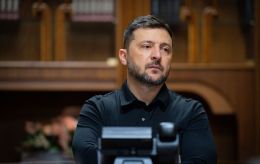Expert on operation Spiderweb: Russia’s strategic bombers only interest historians now
 Illustrative photo: Expert assesses losses of Russia's strategic aviation (ssu.gov.ua)
Illustrative photo: Expert assesses losses of Russia's strategic aviation (ssu.gov.ua)
Russia's strategic aviation has become a matter of historical interest only, following the Operation Spiderweb of the Security Service of Ukraine (SBU), stated aviation expert Valerii Romanenko in a comment to RBC-Ukraine's YouTube channel.
According to the expert, the nuclear triad includes:
-
intercontinental ballistic missiles;
-
nuclear missiles on submarines;
-
strategic aviation equipped with cruise missiles and nuclear bombs.
"And suddenly, at least 10–15% of Russia's strategic aviation is already a thing of the past. The fact that it is no longer part of the active combat fleet means it is now only of interest to historians. For modern military planners and analysts, these aircraft are already decommissioned - either destroyed or so severely damaged that they cannot be repaired," he added.
Romanenko noted that even if Russia attempts to repair the damaged aircraft, the timelines would be indefinite, as the enemy's production capacity is currently overloaded.
"Kazan, where these aircraft were produced, is now fully occupied with the restoration of the Tu-160 and Tu-22. Other factories have already received repair orders that will completely consume their capacity for at least half a year," he explained.
Operation Spiderweb
The operation was carried out on June 1, when drones simultaneously targeted four Russian airfields: Belaya, Dyagilevo, Olenya, and Ivanovo.
It became one of the largest operations since the beginning of the full-scale war. The enemy's estimated losses in a single day totaled $7 billion. As a result of the drone strikes, 41 aircraft from Russia's strategic aviation fleet were hit, including A-50, Tu-95, Tu-22M3, and Tu-160.
More details about this unique special operation can be found in the material by RBC-Ukraine.

